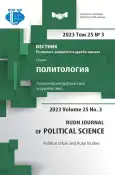The Interaction of Society and Authorities in Urban Development: The Case of Big Cities of Northwestern Federal District
- Authors: Ukhanova Y.V.1,2
-
Affiliations:
- Vologda Research Center of the Russian Academy of Sciences
- Institute of Sociology of the Federal Center of Theoretical and Applied Sociology of the Russian Academy of Sciences
- Issue: Vol 25, No 3 (2023): Political Urban and Rural Studies
- Pages: 663-676
- Section: PUBLIC POLICY IN URBAN SOCIAL LANDSCAPES
- URL: https://journal-vniispk.ru/2313-1438/article/view/322220
- DOI: https://doi.org/10.22363/2313-1438-2023-25-3-663-676
- EDN: https://elibrary.ru/RNVRWG
- ID: 322220
Cite item
Full Text
Abstract
The balanced urban development, the formation of a comfortable urban environment, including the citizens’ active participation in these processes is a priority in the strategic objectives and national projects of the Russian Federation. To reveal the essence of the interactions between society and government the author uses the concept of “civic participation” as a process by which public associations or individuals are involved in interactions with the state (vertical interaction), with other socio-political institutions among themselves (horizontal interaction) to solve socially significant problems. Based on quantitative (questionnaire survey of the urban population, N = 2000) and qualitative (expert interviews, N = 47) methods tested in 5 large cities of the Northwestern Federal District, the author reveals the features of offline and online practices of interaction between the public and authorities, as well as the conditions for their formation in urban development issues. The author concludes that such practices as contacting the authorities and participating in initiative budgeting are more widespread in the cities than, for example, protest participation on the city’s issues. Despite the preference for offline practices for constructive interactions between society and authorities, the active use of information resources and online services is becoming timely. The institutional environment of civic participation is provided with formal regulators, but urban residents are far from being fully informed about them and are not aware of the legal opportunities and limitations that determine their participation in urban development. Informal norms as part of the institutional environment, on the one hand, contribute to the formation of sustainable interactions and organizational infrastructure of socially useful activity; on the other hand, they can be based on the illegal practice of manipulating statuses and resources, which causes the growth of public distrust of state and municipal authorities. The article substantiates the importance of forming a unified information field at the city level on the topical issues of concern to residents, on possible formats of civic participation in the development of a comfortable urban environment. The findings contribute to the understanding of the problems and opportunities for the use of civic participation in urban development.
About the authors
Yulia V. Ukhanova
Vologda Research Center of the Russian Academy of Sciences; Institute of Sociology of the Federal Center of Theoretical and Applied Sociology of the Russian Academy of Sciences
Author for correspondence.
Email: ukhanova4@rambler.ru
ORCID iD: 0000-0001-7307-9520
PhD in History, Senior Researcher, Head of Laboratory, Vologda Research Center; Federal Center of Theoretical and Applied Sociology, Russian Academy of Sciences
Vologda, Russian Federation; Moscow, Russian FederationReferences
- Bulkeley, H., Coenen, L., Frantzeskaki, N., Hartmann, C., Kronsell, A., Mai, L., & Voytenko, Y.P. (2016). Urban living labs: Governing urban sustainability transitions. Current Opinion in Environmental Sustainability, 22, 13–17. https://doi.org/10.1016/j.cosust.2017.02.003
- Jho, W., & Jae, S.K. (2015). Institutional and technological determinants of civil e-participation: Solo or duet? Government Information Quarterly, 32 (4), 488–495. https://doi.org/10.1016/j.giq.2015.09.003
- Khaliy, I.A. (2013). Power and society: In search of interaction. Vlast’ (The Authority), (9), 16–20. (In Russian).
- Khaliy, I.A., Aksenova, O.V., et al. (2015). Power and society in the regions of Russia: Interaction practices Moscow: Institute of Sociology RAS. (In Russian).
- Kiwan, D. (2008). Conceptions of democracy, citizenship and diversity. Education, Citizenship and Social Justice, 2, 223–235.
- Miroshnichenko, I.V., & Morozova, E.V. (2021). Network communities as agencies for the formation of a city’s agenda (the case of «Help the city» movement). Political expertise: POLITEX, 17 (2), 135–149. (In Russian). https://doi.org/10.21638/spbu23.2021.202
- Nikovskaya, L.1., & Yakimets, V.N. (2022). Municipal public policy as an indicator of the quality of interaction between government and society at the local level. Local law, (4), 3–20. (In Russian).
- Petukhov, V.V. (2019). Civic participation: Interaction of social and political practices. Sociological Research, (12), 3–14. (In Russian). https://doi.org/10.31857/S013216250007743-0
- Pimoljinda, T., & Siriprasertchok, R. (2017). Failure of public participation for sustainable development: A case study of a NGO’s development projects in Chonburi province Kasetsart. Journal of Social Sciences, 38(3), 331–336. https://doi.org/10.1016/j.kjss.2016.08.016
- Raven, R., Sengers, F., Spaeth, P., Xie, L., Cheshmehzangi, A., & Jong, M. (2019). Urban experimentation and institutional arrangements. European Planning Studies, 27(2), 258–281. https://doi.org/10.1080/09654313.2017.1393047
- Shcherbakova, I.V. (2017). Тerritory of residence as a factor of civic involvement. Sociological Research, 23(3), 64–79. (In Russian). https://doi.org/10.19181/socjour.2017.23.3.5364
- Shumate, M., Hsieh, Y.P., O’Connor, A. (2018). A nonprofit perspective on business-nonprofit partnership: Extending the symbiotic sustainability model. Business and Society, 57(7), 1337–1373. https://doi.org/10.1177/0007650316645051
- Sokolov, A.V. (2020). Features of collective action in modern Russia: Dynamics, digitalization and results. Socialʹnye i gumanitarnye znania, 6(1), 30–45. (In Russian). https://doi.org/10.18255/2412-6519-2020-1-30-45
- Sokolov, A.V., & Isaeva, E.A. (2022). Transforming the interaction between authorities and civil society in digital: The evidence from the Yaroslavl Region. RUDN Journal of Political Science, 24(4), 686–710. (In Russian). https://doi.org/10.22363/2313-1438-2022-24-4-686-710
- Ukhanova, Y.V. (2020). The phenomenon of civic participation in scientific discourse: Theoretical and methodological background of the research. The Journal of sociology and social anthropology, 23(3), 25–50. (In Russian). https://doi.org/10.31119/jssa.2020.23.3.2
- Ukhanova, Y.V. (2022). Civil participation of the territorial community: Theoretical foundations and practical development. Vologda: VolRC RAS (In Russian).
- Ukolov, V.F. (2009). Interaction between government, business and society. Moscow: Economics (In Russian).
- Vestergaard, A., Murphy L., Morsing, M., & Langevang, T. (2018). Cross-sector partnership as capitalism’s new development agents: Reconceiving impact as empowerment. Business and Society, 1–38. https://doi.org/10.1177/0007650319845327
- Yakimets, V.N., & Nikovskaya, L.I. (2018). Mechanisms and principles of intersectoral social partnership as a basis for developing the public-state governance. Vlast’ (The Authority), 26(4), 15–25. (In Russian). https://doi.org/10.31171/vlast.v26i4.5757
Supplementary files









